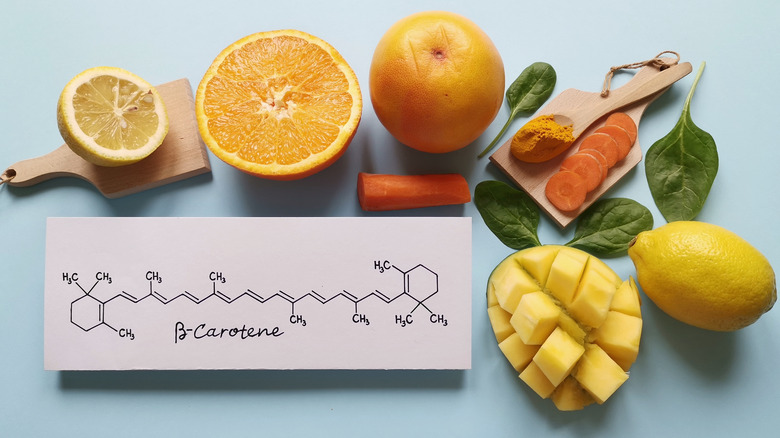What Are Beta-Carotenes And Are They Good For You?
Beta-carotene, which comes from the Latin word for carrot, is the pigment that gives certain plants and vegetables their rich color. Beta-carotene is also an important part of maintaining a healthy body as it is a key antioxidant. Once consumed, beta-carotene converts into vitamin A, which protects the body's immune system by fighting against damaging free radicals that can lead to serious health issues. Vitamin A is also important for supporting healthy skin, good vision, and overall eye health (via Mount Sinai).
According to studies, people who consume four or more servings of beta-carotene rich foods on a daily basis may be less likely to develop heart disease and certain cancers. Beta-carotene may also be helpful in treating certain medical conditions. For instance, in one clinical trial, participants suffering from macular degeneration — an age-related eye disease affecting the retina — who ate foods with beta-carotene, along with other vitamins and minerals, experienced a slower progression of the disease. Another study focusing on middle-aged and older men found that participants who ate carotenoid-rich foods were at lower risk for developing metabolic symptoms, which are factors that can increase heart disease and diabetes.
While experts at Mount Sinai support multiple daily servings of foods containing beta-carotenes as an important component of a healthy diet and there is otherwise no recommended daily allowance, they also point out that there can be side effects, which can include temporary yellowing of the skin, loose stools, and joint pain. They also advise that deriving beta-carotene from natural foods is more effective compared to taking supplements. Getting beta-carotene from foods rather than supplements will also be safer if you are taking certain medications or consume alcohol on a regular basis.
Which fruits and vegetables contain beta-carotene?
Given that it's built into the name, carrots and foods prepared with carrots are obvious sources for beta-carotene. However, you don't need to stop at carrots and other orange fruits and vegetables to get your daily dose of beta-carotenes. The experts at Healthline recommend that you also incorporate dark leafy greens and other green vegetables into your diet, as these are powerful sources of antioxidants that also contain beta-carotenes.
Examples of plant-based foods beyond carrots that are rich in beta-carotenes include sweet potatoes, butternut squash, apricots, cantaloupe, red and yellow peppers, kale, spinach and romaine lettuce. Beta-carotene can also be found in certain herbs and spices, such as paprika, parsley, cilantro, and sage, among others. And the body will absorb the beta-carotene in these foods, herbs, and spices even more when paired with healthy fats.
To get a better sense of how much beta-carotene is contained in various foods, Healthline suggests visiting the United States Department of Agriculture (USDA) food database.


